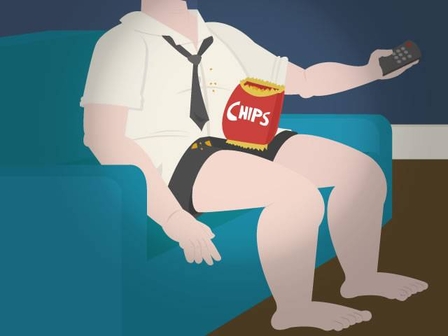
We live in a society today that is constantly changing their findings and recommendations in the nutrition subject. Merely every finding or experiment is contradicting or misleading. Some people are at the point where it is difficult to find anything worth eating. There are so many health issues involving our diet and many people strive to be cautious of their food selections. It is challenging to achieve a healthy diet when you read all these articles that say different things. So, even with this article, take what you want from it and apply it to some of your other findings. There really is no right or wrong with nutrition these days, because you will always find some information or person telling you something completely different. The list below shows five habits seen today that are surprisingly making you fat:
1. Sleep deprivation.
The sleeping too much or little phenomenon is simple. There has been excessive research and findings to prove this theory to be true. It’s pretty basic and it all has to do with the body’s hormone levels. There are two key hormones in the body that regulate our eating, ghrelin and leptin. When you are sleep deprived, your body has more ghrelin in your system, which is the hormone that tells your body it needs to eat. Leptin is the hormone that tells your body to stop eating, and when you have not achieved a good night’s sleep, your leptin levels are low. Another negative aspect of sleep deprivation is that your metabolism is not working properly. All of these factors combined equals weight gain. Check out this post that offers dieting techniques to suppress appetite.
2. Eating free foods at restaurants.
Restaurants that offer free food at the beginning of the meal just might be too good to be true. These foods are free for a reason. Olive Garden’s free breadsticks or Texas Road House’s rolls with the honey butter are only hindering your weight loss goals. If you are really too hungry to wait for you food, try eating a food that helps fight belly fat before you go to the restaurant. That will tide you over and aid in weight loss as well. Especially, when these free foods are only adding additional calories to your (probably already high calorie) meal. These foods are basically junk food and they offer zero nutritional value.
3. Drinking soda–even diet.
A 2005 study suggests that drinking one to two sodas per day increases your chances of being overweight or even obese by nearly 33 percent! Next time you are at a restaurant, I’d maybe think twice about your drink order. Cutting back on soda is one of the best ways to get back on track with your target weight. Many people have taken to diet soda, because the fewer calories, however, diet sodas can actually increase weight gain more than regular sodas! The artificial sweeteners contained in diet sodas is the reason for the extra weight gain. They trigger appetite cues, which causes people to overeat.
4. Eating too quickly.
This is one of the main reasons for weight-gain, and it is also one of the easiest to avoid. Americans and people worldwide could eliminate the chance of weight gain by simply eating a bit slower, however, few people can manage to even do that. It is a fact that our bodies take at least 20 minutes for your stomach to tell your brain that it is full. If you scarf down your plate in less than 20 minutes and then ask for seconds right after, you are probably overeating. A study in the Journal of the American Dietetic Association found that slow eaters took in 66 fewer calories per meal than non-slow eaters. This could make a huge difference in your weight-loss journey, and it is extremely simple to apply to your life if you just think about it.
5. Eating low-fat foods.
This is one of the most surprising–however very accurate–habits that are seen in Americans today. There are many reasons why low-fat foods are making Americans fatter than just regular-fat foods. First, the foods are only cutting off fat, not the calories or the carbohydrates. You will see a slight difference in calories and more carbs (which is what makes people fat) in the low-fat foods. Another reason low-fat foods make people fat is that the people get a false illusion that if they are eating something low in fat, then they can eat more quantities, which results in overeating. The last reason is the carbohydrates found in the low-fat foods are low-performing carbs that digest quickly, making the consumer hungrier quicker than usual. The Harvard School of Public Health states that although Americans eat less fat today than they did in the 1960’s, they are heavier now. Another important factor to consider is there are many risks of eating a low-fat diet. To name a few of them, there are: depression, increased cancer risk, overeating, and poor vitamin absorption.